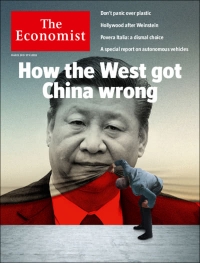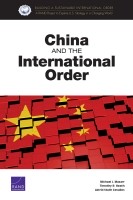 Over the course of his first five-year term, Chinese President Xi Jinping passed up repeated opportunities to avert rivalry with Washington, argues Ely Ratner, Executive Vice President and Director of Studies at the Center for a New American Security, and Deputy National Security Adviser to U.S. Vice President Joe Biden from 2015 to 2017. His increasingly revisionist and authoritarian turn has instead eliminated the possibility of a grand bargain between the United States and China. On most issues of consequence, there is simply no overlap between Xi’s vision for China’s rise and what the United States considers an acceptable future for Asia and the world beyond, he writes for Foreign Affairs:
Over the course of his first five-year term, Chinese President Xi Jinping passed up repeated opportunities to avert rivalry with Washington, argues Ely Ratner, Executive Vice President and Director of Studies at the Center for a New American Security, and Deputy National Security Adviser to U.S. Vice President Joe Biden from 2015 to 2017. His increasingly revisionist and authoritarian turn has instead eliminated the possibility of a grand bargain between the United States and China. On most issues of consequence, there is simply no overlap between Xi’s vision for China’s rise and what the United States considers an acceptable future for Asia and the world beyond, he writes for Foreign Affairs:
A China-dominated order would mean a United States with weaker alliances, fewer security partners, and a military forced to operate at greater distances. U.S. firms would be left without access to leading technologies and markets, and disadvantaged by new standards, investment rules, and trading blocs. Inert regional institutions would be unable to resist Chinese coercion, and the world would see a steady decline in democracy and individual freedoms. The net result would be a less secure, less prosperous United States that would be less able to exert power in the world.
“For now, enhancing American competitiveness to prevent this kind of illiberal Chinese sphere of influence should be the cardinal aim of U.S. China strategy,” Ratner concludes.
 In his 2005 “responsible stakeholder” speech, then-US Deputy Secretary of State Robert Zoellick told the West that global-governance institutions must include China or risk being overturned, notes Mark Leonard, Director of the European Council on Foreign Relations. But to the Chinese, international engagement was never a binary choice. So, rather than becoming a responsible stakeholder in the US-led order, China is now developing what might be described as internationalism with Chinese characteristics.
In his 2005 “responsible stakeholder” speech, then-US Deputy Secretary of State Robert Zoellick told the West that global-governance institutions must include China or risk being overturned, notes Mark Leonard, Director of the European Council on Foreign Relations. But to the Chinese, international engagement was never a binary choice. So, rather than becoming a responsible stakeholder in the US-led order, China is now developing what might be described as internationalism with Chinese characteristics.
‘Defanging’ China
Accordingly, China has taken advantage of membership in Western-dominated institutions while simultaneously defanging them and building a parallel system of its own, he writes for Project Syndicate.
 Democratic societies must reckon with the challenges presented by Beijing’s sharp power, according to a leading analyst. The challenge is multifaceted, and so must be any response, said NED Vice President for Studies and Analysis Christopher Walker.
Democratic societies must reckon with the challenges presented by Beijing’s sharp power, according to a leading analyst. The challenge is multifaceted, and so must be any response, said NED Vice President for Studies and Analysis Christopher Walker.
“Society-wide responses are needed that take into account the reality that the democracies cannot rely solely on governmental measures for meeting what is a complex, multidimensional challenge,” he told the Canadian Standing Senate Committee on Foreign Affairs and International Trade. “At the same time, democracies must take care that they do not make things worse. Democratic systems cannot sacrifice their own standards and values as a way of safeguarding against the authoritarian sharp power.”
Walker testified on the threat of sharp power to the integrity of democracies in the context of cultural diplomacy, emphasizing the malign objectives pursued by authoritarian governments under the guise of shaping public opinion and perceptions around the world.
The Chinese Government has long imposed harsh policies against unregistered Christian churches, Uyghur Muslims, Tibetan Buddhists, Falun Gong practitioners and other new religious movements labeled as cults, the Congressional Executive Commission on China adds. Set against this grim backdrop, the number of Chinese religious believers has grown rapidly for several decades. In 2016 Chinese President and Communist Party General Secretary Xi Jinping launched a “sinicization” campaign, resulting in unprecedented efforts to manage, control, and even transform the religious practices of tens of millions of China’s citizens.
Revised Religious Affairs Regulations took effect in February 2018, and the United Front Work Department (UFWD) took over direct responsibility for religious and ethnic affairs. The UFWD is charged with securing the support of non-Party sectors of society, including religious groups. By placing religion under the direct management of the UFWD and issuing new legal rules to govern religious practice, Xi Jinping has asserted more direct control over religious life in China. In the past year, religious venues were demolished, Bibles burned, and over a million Uyghurs and other Muslim ethnic minorities were interned and many were forced to renounce their religious faith.
The hearing will look at conditions faced by religious believers in China, explore State Department religious freedom efforts, and seek recommendations for Congressional action.
The Communist Party’s Crackdown on Religion in China
Wednesday, November 28, 2018. 3:00 pm- 5:00 pm.
Dirksen 106, Capitol Hill, Washington, DC
The hearing will be livestreamed via the “Live Hearings” link on our webpage and the CECC’s YouTube channel.
Witnesses:
Mihrigul Tursun, Uyghur Muslim detained in Chinese “political reeducation” camp
Dr. Tom Farr, President, Religious Freedom Institute
Dr. Samantha Hoffman, Visiting Academic Fellow, Mercator Institute for China Studies (MERICS) and Non-Resident Fellow, Australian Strategic Policy Institute







